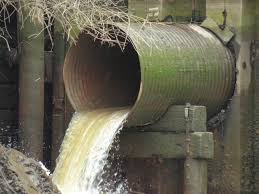The Trump Administration’s Latest Efforts to Hobble the Clean Water Act
Legal Planet: Environmental Law and Policy 2019-07-15

 By now, readers of Legal Planet are well aware of President Trump’s ongoing efforts to rescind the Obama Administration’s “Waters of the United States” rule and replace it with a new federal regulation that dramatically circumscribes federal regulatory authority under the Clean Water Act. My Legal Planet colleagues and I have previously blogged on this topic, and I won’t retread that ground here.
By now, readers of Legal Planet are well aware of President Trump’s ongoing efforts to rescind the Obama Administration’s “Waters of the United States” rule and replace it with a new federal regulation that dramatically circumscribes federal regulatory authority under the Clean Water Act. My Legal Planet colleagues and I have previously blogged on this topic, and I won’t retread that ground here.
But the Trump Administration’s efforts to eviscerate the federal Clean Water Act continue apace. Earlier this year, President Trump launched–by Executive Order, of course–a new process designed to circumscribe dramatically states’ longstanding authority to review applications for federal permits for any activity that may result in a discharge to a water body within a state’s boundaries. That proposal is fundamentally flawed, both on its merits and in the procedures USEPA is using to implement it. Even more troubling, the Trump Administration’s proposed section 401 “reforms” ignore express Congressional text and intent; are inconsistent with U.S. Supreme Court decisions interpreting section 401; and contravene basic principles of federalism.
When Congress enacted the CWA in 1972, it carefully incorporated numerous provisions designed to divide responsibility for regulating water quality and reducing pollution among federal regulators and the states. Perhaps the most prominent example is CWA section 401, which requires every applicant for a federal permit or license for any activity that “may result in any discharge into navigable waters” to provide the federal permitting agency with a certification from the state in which the discharge will occur that the discharge will comply with various provisions of the CWA, “and with any other appropriate requirement of state law.” Over the years, the U.S. Supreme Court has repeatedly interpreted the states’ section 401 certification authority broadly in such cases as its 1994 decision in Public Utility District No. 1 v. Washington and S.D. Warren v. Maine in 2006. Over the 47 years of its existence, the CWA’s section 401 certification process has worked quite well and in a relatively uncontroversial manner. Until now.
This past April, President Trump issued Executive Order 13868, revealingly-titled “Promoting Energy Infrastructure and Economic Growth.” Section 3 of that Executive Order directs USEPA to quickly replace longstanding EPA policy regarding states’ CWA section 401 certification authority in favor of a new, far more circumscribed state role. Specifically, the Executive Order mandates EPA, within 60 days, to jettison the agency’s longstanding section 401 policies in favor of new administrative “guidance” that dramatically reduces the states’ traditional 401 authority. The E.O. goes on to order EPA to initiate formal rulemaking proceedings within 120 days to finalize those “reforms.”
(The backstory to the Executive Order is that several states–most prominently Washington and New York–have recently invoked their section 401 certification authority to question certain controversial, proposed energy projects that will, indeed, pollute state waterways. The energy companies pursuing these coal, petroleum and natural gas projects have complained to the Trump Administration, beseeching the federal government to green-light those projects notwithstanding the environmental concerns of the affected states. And their pleas for relief from the CWA’s mandates have found a receptive audience in the White House. Hence the Executive Order.)
EPA dutifully issued its “Revised Section 401 Guidance Policy” last month. It did so notwithstanding strong protests from a bipartisan coalition of state government organizations, led by the Western Governors’ Association and the National Conference of State Legislatures. Those organizations understandably criticized, as an affront to basic principles of federal-state comity, the Administration’s rush to scrap a 47-year old set of policies interpreting and applying CWA section 401 without any significant, prior consultation with the affected states.
 Among other things, EPA’s Revised Section 401 Guidance Policy seeks to limit the time states may have to complete their section 401 consistency review for proposed projects, and purports to narrow substantially the grounds upon which states may deny consistency to projects that may pollute their waterways. The Guidance Policy asserts that it is intended merely to “clarify” current statutory and regulatory provisions pending completion of USEPA’s promised, formal rulemaking proceedings. But in fact that Policy represents a dramatic change to the government’s longstanding section 401 policy and interpretation of the CWA. (USEPA in its policy also announces its plan to initiate the rulemaking process by August 19th.)
Among other things, EPA’s Revised Section 401 Guidance Policy seeks to limit the time states may have to complete their section 401 consistency review for proposed projects, and purports to narrow substantially the grounds upon which states may deny consistency to projects that may pollute their waterways. The Guidance Policy asserts that it is intended merely to “clarify” current statutory and regulatory provisions pending completion of USEPA’s promised, formal rulemaking proceedings. But in fact that Policy represents a dramatic change to the government’s longstanding section 401 policy and interpretation of the CWA. (USEPA in its policy also announces its plan to initiate the rulemaking process by August 19th.)
The Trump Administration’s efforts to cluster-bomb states’ section 401 certification authority will not go unchallenged. A coalition of state attorneys general led by California and New York has already submitted comments to the EPA in which they allege that the Administration’s newly-crafted interpretation of section 401 is patently erroneous, and that EPA’s efforts to implement that interpretation via formal regulation violate the plain language of the CWA itself and are therefore illegal. So unless the Administration reverses course, litigation challenges to the Trump Administration’s newly-embraced section 401 policy seem inevitable.
What’s especially disheartening is that the Trump Administration appears ready to consign to the regulatory dustbin nearly a half-century of bipartisan efforts to apply CWA section 401 in a meaningful fashion, consistent with the express language of the CWA and congressional intent. And the Administration is doing so based not on any broad-based dissatisfaction with the manner in which section 401 has been implemented by federal and state governments over the past half century. Rather, the Administration’s actions to severely circumscribe longstanding state certification authority under the CWA is nothing more than a transparent effort to support the fossil fuel industry in its efforts to move forward with a handful of problematic energy projects, at the expense of improved water quality and longstanding principles of cooperative federalism.